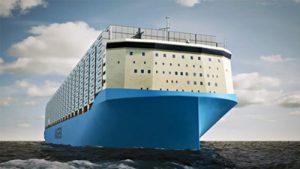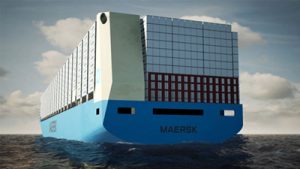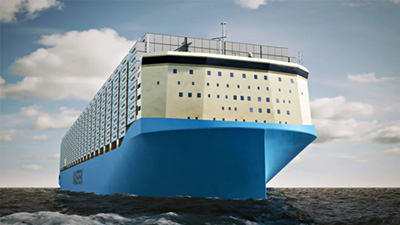
In early December, Danish shipping company Maersk unveiled the design of its eight 16,000 TEU container vessels that are to be powered by carbon-neutral alternative biofuel methanol.
The design, according to Maersk Chief Technical Officer Palle Laursen, provides a 20% improved energy efficiency per transported container compared to the industry average for vessels in this size. Additionally, he said, the entire series is expected to save around a million tons of annual CO2 emissions.
The vessels, Laursen said, are designed to be 350 meters (1,148 feet) long, 53.5 meters (175.5 feet) wide and would look significantly different from what has been seen before for any larger container vessels.
The design includes crew accommodation and bridge located at the bow to enable increased container capacity, plus the funnel will be in the aft, and only on one side of the vessel, thereby providing further space for cargo. The separation between accommodation and funnel is also expected to improve efficiency when at port.
“When designing these, our ambition was to make sure the new vessels could service our customers in a smarter way while contributing to their carbon-neutral transportation goals,” Laursen explained.

“The making of this took nearly five years, and all while crossing uncharted naval design territory,” he continued. “To enable this new design, several challenges had to be addressed. Firstly, crew comfort had to be ensured with the accommodation placed in this more exposed location. Moreover, adequate hull strength was also a key parameter to safeguard, with the accommodation block normally working as a hull ‘stiffener’ when placed further backwards.”
Also, he said, new arrangements for lifeboats and navigational lights had to be developed, as well as new cameras to support the captain’s view when navigating.
The series of vessels, built by Hyundai Heavy Industries, will come with a dual-fuel engine setup that can operate on methanol and conventional low-sulphur fuel. With fuel capacity, the vessels will be able to complete an entire round-trip on green methanol, according to Maersk, for example from Asia to the U.S. West Coast.
The first vessel is scheduled to be in operation by early 2024.
“We look forward to getting these vessels across the world’s oceans and continuing our work in creating new solutions to improve the efficiency of our customers’ future supply chain,” Laursen said.

